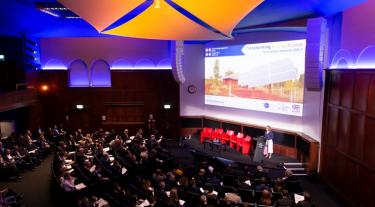The event brought together 225 delegates representing a range of policymakers, African Ministers and Ambassadors, investors, programme managers, energy innovators and entrepreneurs, and wider stakeholders who share a strategic interest in innovations, which can accelerate the achievement of SDG 7.
The need for acceleration and more collaborative efforts were emphasised throughout the day by a range of speakers including Amadou Hott, Vice President Power Energy Climate change and Growth from the African Development Bank; Rachel Kyte, CEO of SEforALL and Special Representative of the UN Secretary-General and Seleshi Bekele, Minister of Water, Irrigation and Electricity from the Ethiopian Government.
By convening a range of latest UK aid supported innovations contributing towards the achievement of the SDG 7 goals, the event aimed to improve coordination between innovators, co-funding partners and programmes and facilitate knowledge exchange between them on technology, business model, and financial innovations in clean energy access.
As well as the keynote sessions, the event delivered 15 breakout sessions and roundtables on focussed topics including the Future of Cooking, Energy Storage, Digital Energy, Financing the Transformation, Unlocking Mini-Grids and more.
During the opening plenary, the UK Government’s Minister for Africa, Harriett Baldwin announced a £30 million uplift in funding for the Transforming Energy Access (TEA) programme. This announcement brings the total UK investment into the programme to £100 million, securing its future until 2024 enabling it to build on success to-date. The TEA programme has already resulted in a reduction of 2 million tonnes of carbon emissions and improved the lives of 3.2 million low-income people. It has also leveraged $359 million worth of investment in clean energy from the public and private sectors.
Jon Lane, Head of Energy Access, the Carbon Trust, welcomed the additional funding:
“The TEA programme is focussed on delivering new technical, financial and business model innovations to market whilst building African capacity in delivering energy access. The ambition of the programme is exceeded only by its necessity. This funding is a critical boost to support African nations in achieving their energy, economic, environmental and social goals and we welcome the UK governments’ ongoing support in working towards a cleaner, greener and more equal global energy community.”
The Carbon Trust, CLASP and the Energy Saving Trust supported the organisation of the event through their lead roles in the Transforming Energy Access (TEA) and Low Energy Inclusive Appliances (LEIA) programmes.


